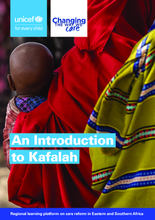This paper aims to contribute to a better understanding of the nature and characteristics of Kafalah and identify effective strategies to support Kafalah.
It covers the characteristics of Kafalah, its legal implications, what distinguishes Kafalah from other forms of family-based alternative care, and ongoing efforts to promote Kafalah in Eastern and Southern Africa. It concludes with implications for policy and practice.

